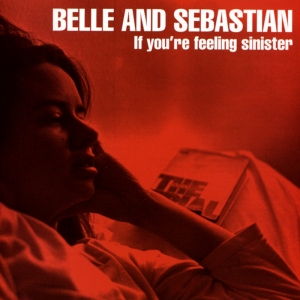

This album already has so much acclaim parading behind it that a critic can hardly feel that he has the liberty to review it. In its short existence, If You’re Feeling Sinister has already been included on a number of best-of lists; in fact, Pitchfork rated this masterwork at number 14 on their list of the greatest albums of the ’90s. I cannot know if I agree with that, since any such list would be completely idiosyncratic, but I admit that If You’re Feeling Sinister is a spectacular album that transcends time and is still fresh nearly nine years into the new millennium.
This is quite an interesting phenomenon, because technically, the album is actually a time-traveling exercise back into the sound of the late 1960s. The album’s influences are hardly arbitrary: In fact, I’d be surprised if Belle and Sebastian didn’t actually set out to imitate early Brit pop bands, especially the Kinks—hell, Stuart Murdoch even has Ray Davies’ vocal vibe on this album, with his occasionally unsteady vocals strongly reminiscent of the Kinks frontman’s circa-1966. Other “accidental” influences do sneak in, particularly Bob Dylan, whose name is even evoked in one of the song titles, but on the whole, the album is a venture into British hall-inspired pop music, something that you would not have believed to be currently in vogue.
But it was in 1996 and it still is, and it’s the manner in which Belle and Sebastian reinvented Britpop that makes this album so fascinating. The group applied a typical indie-style production, with its amateur violin sounds and simple progressions, to traditional Britpop, a move that turned out to be a great decision. What results is tight, accessible and intelligent, all of which can hardly be expressed better than in the opening “Stars of Track and Field.” The song deceives you into thinking that it is simplistic, as it begins with light rhythm guitar and saccharine vocals before a string of bass notes is pulled from the center. Soon enough, the song is epic lush pop, with piano, strings, and a gorgeous guitar-and-drum build-up during the chorus. The ending of the song is where its gets really dense in its combination of horns, piano, drums, and layered vocals, and it is also at this point that you realize how much If You’re Feeling Sinister has already accomplished.
The album progress in the next few numbers too. “Seeing Other People” is classic piano pop and features one of the best vocal performances on the album, while “Me and the Major” is a folksy rocker with a harmonica freak-out that is defiantly Dylan-esque. Surprisingly, “Dylan in the Movies” is far less Dylan-esque and far more baroque pop. Nonetheless, it’s still a great song, with the chorus alluding the classic Dylan biopic “Don’t Look Back” and the line “It’s not your money they’re after / Boy it’s you” evoking the paranoid theme of many Dylan songs. These songs are so good that you hardly notice the minor flaws of the ballad “Fox in the Snow,” which is too mellow but still manages to be entertaining enough with its violin counterpoint.
Problems become more noticeable in the second half of the album. “Get Me Away From Here I’m Dying” is an attempt at the slower, folksier side of music, and it would succeed were it not for the sugary instrumentals in its second half: The horns and the xylophone typify the song in context of the album and take away from the beautiful quaking vocals. “The Boy Done Wrong Again” features the most Davies-like vocals, but the song is ruined by its uninteresting melody laid on top of a quite interesting texture. “Mayfly” is likely the best out of these lesser numbers, since it is legitimately unique in its rapid chord ejaculation and polyphonic guitar; still, it isn’t half as inspirational as “Me and the Major.”
Granted, it hardly matters those numbers surround “If You’re Feeling Sinister” and “Judy and the Dream of Horses.” “If You’re Feeling Sinister,” is a complex suicide song, with its bouncing bass rhythm contrasted by the vocal melody’s slow, foreboding ascent up the scale. The song is underscored by the sound of children playing, setting up a foil that highlights the depression and hopelessness in “If You’re Feeling Sinister.” The closing “Judy and the Dream of Horses” is hardly more joyous, as it relates a story of a girl who is busy living in her dreams. The song is jazzy and free-flowing, mostly depending on acoustic guitar chugging and a few wind instruments and horns. The piece is quite fulfilling, but ironically enough, it seems to be a song about not getting fulfillment in general. There is an undercurrent of frustration throughout the numbers, and though it never is explained or accounted for throughout the album, it’s omnipresent.
Its presence does serve a purpose in the end though. Belle and Sebastian did not set out to write a 1960s album in the 1990s; they wanted to write a 1990s album for the 1990s. I could never imagine Ray Davies penning these complex stories about relationships, sex, death or boredom. Davies’ style was based in ultimate simplicity, and it seems that to Belle and Sebastian, simplicity did not satisfy the needs of a generation that wanted to rebel against the lack of certainty, purpose and satisfaction in life without the riot. What we needed was an intelligent, relatable album, and Belle and Sebastian delivered a work whose music and message we could understand. If You’re Feeling Sinister is neither irrational nor furious: It is a quiet sit-in against life's confusions, and in its civil disobedience, its point comes across clearly.